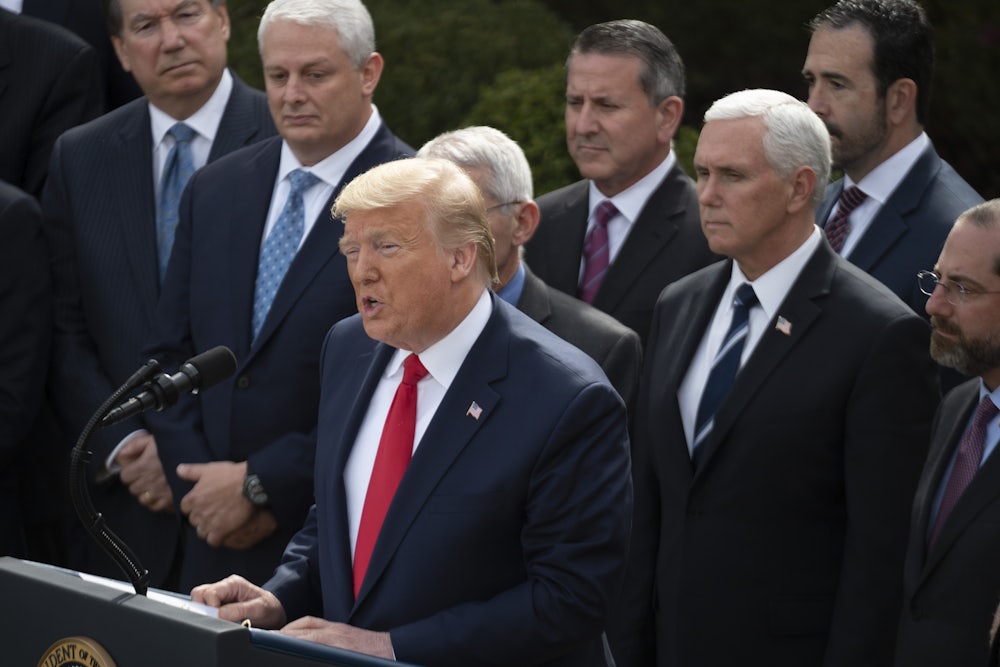All I can think about is my hands: the surfaces they’ve touched, the doorknobs they’ve turned, the itches they’ve scratched (always, invariably, on the face). I think about the last time my hands were scrubbed clean with soap and water; I think about my phone, too, which is basically an extension of my hand, a greasy repository for the world’s grubbiness. I feel that I am no exception in this regard, that this is just the way it is now.
So it was with morbid awe that I watched President Trump hold a press conference on Friday about the coronavirus in which neither he nor Vice President Pence nor a cabal of chief executive officers from a select group of companies seemed at all conscious of what their hands were doing. They touched the same microphone. They gripped the same lectern. They shook the hands of other people. It seemed like footage from ancient history, when our hands were innocent things, not the very vessels of death and disease.
a minute's worth of footage of trump and health-care execs fondling the same mic and touching each other. reassuring presser, overall! pic.twitter.com/T3Zjw0IXqB
— Andrew Kirell (@AndrewKirell) March 13, 2020
It seemed that none of these people had internalized the fact of the coronavirus, which experts say has the potential to spread exponentially and which, in a few short weeks, has come to dominate our lives to the exclusion of almost everything else. If any of these people had set foot in the country’s largest city this past week, they would have experienced intimations of the end times depicted in movies: empty subway cars, empty shelves at the grocery store, the eerie calm that precedes the storm. The politicians and businessmen at the press conference were all strangely absent from this reality, even though the whole point was to show the country how present and engaged they were with the problem; how devoted they were to solving it. This absence has turned out to be the theme of Trump’s response to the coronavirus crisis: He just isn’t there.
The ostensible occasion for the press conference was the declaration of a national emergency—“two very big words” in Trump’s bright-lights formulation—which opens sluices of federal aid to help combat the coronavirus’s spread. Yet nothing in Trump’s demeanor suggested any appreciation of the gravity of the situation. He slurred the words he read grudgingly off the page. He livened up a little when (inaccurately) disparaging the (far superior) responses of other countries. For the most part, he muddled through his role as crisis manager in chief with all the interest of a child forced to participate in the school play.
He trotted out chief executives from Walmart, Target, and Walgreens, who all promised to make their facilities available for coronavirus tests that, as yet, exist only in desperately inadequate numbers. To address a testing shortage, a flowchart on posterboard was unveiled to announce a Google-sponsored website to help people figure out whether they really need a test. [Update: Google says it is not hosting such a site.] Trump rounded out this dream-team coronavirus-fighting effort with the declaration that the government would buy a lot of crude oil to keep prices from crashing. As my colleague Kate Aronoff put it, the White House had produced a “Rube Goldberg machine of a public-private partnership to handle testing in a pandemic,” while handing out a subsidy to the oil and gas industry. Naturally, stocks of fossil fuel companies spiked.
But it was only after the closing bell had sounded on Wall Street that the press conference grew truly alarming. The decisive moment came when Trump was asked whether he took responsibility for the test shortage. “No, I don’t take responsibility at all,” he responded, words that will come to haunt him if the crisis takes a sharp turn for the worse. He added, “Because we were given a set of circumstances, and we were given rules, regulations, and specifications from a different time. It wasn’t meant for this kind of—an event with the kind of numbers that we’re talking about.”
This was apparently a reference to the regime he inherited from his predecessor, Barack Obama, who increasingly became a focal point of Trump’s anger. It was Barack Obama, Trump said, who messed up America’s response to the swine flu. It was Barack Obama, Trump has hinted, who hobbled his own efforts to contain the coronavirus. “The Obama administration made a decision on testing that turned out to be very detrimental to what we’re doing, and we undid that decision a few days ago so that the testing can take place in a much more accurate and rapid fashion,” Trump said earlier in March.
The Obama administration, in fact, moved with relative alacrity to contain the swine flu. The Trump administration, in fact, has not made any “decision” to ramp up coronavirus testing. What the Trump administration actually did was to eliminate the office for pandemic response that the Obama administration had set up within the White House, which was pointed out during the press conference by PBS News Hour correspondent Yamiche Alcindor. That’s when Trump fell apart. “I think it’s a nasty question,” he spat, before denying any involvement in closing the office, as if it had been carried out by someone else, under some other president’s authority—as if his hands were clean, so to speak.
Toward the end of the press conference, Trump was asked whether he himself would be tested for the virus, after he came into contact with an infected Brazilian official at Mar-a-Lago. He reluctantly admitted, “Most likely, yeah,” adding, “I think I will do it anyway. Fairly soon.” I wouldn’t wish the coronavirus on anyone, not even Trump, but it just might be the only way this hopeless sociopath feels its impact.
